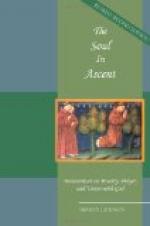Jesus is said to have been a man of sorrows and acquainted with grief, and, therefore, has led the long procession of the broken-hearted toward hope and peace. There is no other place known among men for the cultivation of sympathy except the school of suffering.
If possible, faith even more than sympathy is dependent on struggle. There is no other conceivable means by which it can be acquired. It cannot be imparted. No multiplying of words increases faith. If one has been in the blackest darkness and some way, he knows not how, has been led out into light, it will be easier for him to think that the same experience may be realized again. If every sorrow has had in it some hidden seed of blessing; if the overcoming of hindrances has ever increased strength; if at the very moment that calamity seemed ready to destroy the storm has blown around, and this has occurred again and again, it is impossible to refrain from expecting, or at least hoping, that behind the darkness an unseen hand is making things to work for good. Faith is essential to courage. He never cares to struggle who knows that failure is just ahead. Courage is required as the soul progresses, and becomes more deeply conscious of the mysteries and enemies by which it is surrounded. Faith results from the experience of beneficent leading. If one has been guided by love through many periods, and if that love has always been found waiting for its object on every corner of life, it will, ere long, be expected, watched for, and trusted.
Strength, vision, sympathy, courage, the fair attributes of the soul, all appear as it overcomes difficulties, fights doubts, goes deep into sorrow, and thus learns to realize that it is being led. It is easy to see how sorrow, pain, and death in the older legends and poetry were so often spoken of as beneficent angels. They are like those Sisters of Charity who hide beneath their long black bonnets serene and angelic faces. The austere in human life has never yet been explained, but it has been justified millions of times, and will be justified every time a human soul rises toward the goal for which all were created and toward which all, slowly or swiftly, are moving.
These conclusions have many confirmations, and with some of them it will be worth while to spend a little time. Every thinking man’s experience assures him that he grows by overcoming. Emerson has finely said that we have occasion to thank our faults, by which he means limitations; and he has also reminded us that the oyster mends its broken shell with pearl.
We do not like overmuch to read with care our own experiences; but, when we are honest, we see that every struggle has left a residuum of added strength, that every loss has been a gain, that every calamity has opened doors into a larger world, and that what has been dreaded most has really most enriched us. Experience is a wise teacher.




